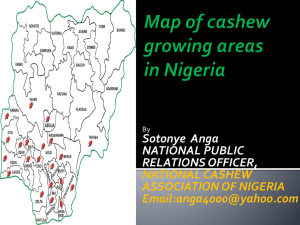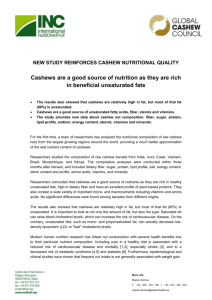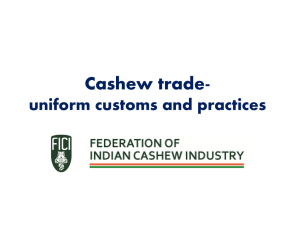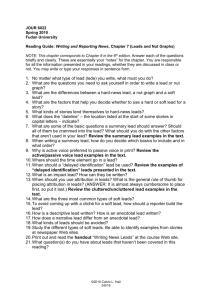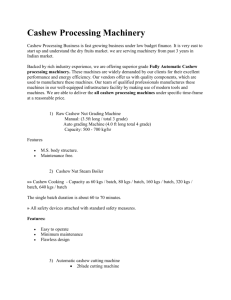Document 11961282
advertisement
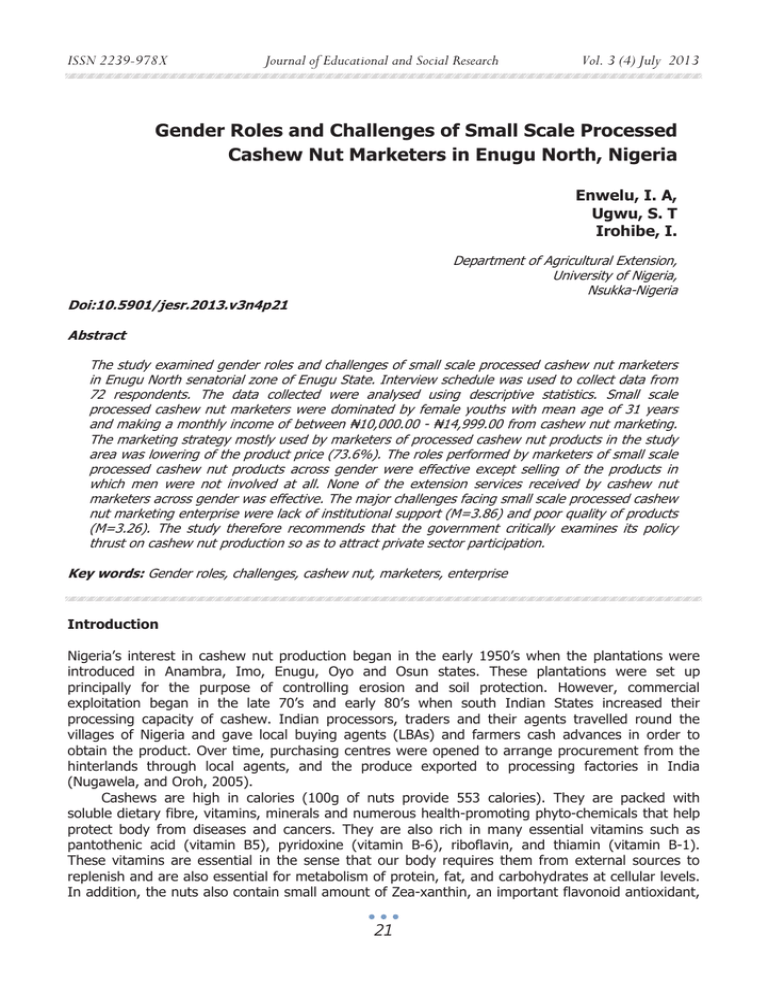
ISSN 2239-978X Journal of Educational and Social Research Vol. 3 (4) July 2013 Gender Roles and Challenges of Small Scale Processed Cashew Nut Marketers in Enugu North, Nigeria Enwelu, I. A, Ugwu, S. T Irohibe, I. Department of Agricultural Extension, University of Nigeria, Nsukka-Nigeria Doi:10.5901/jesr.2013.v3n4p21 Abstract The study examined gender roles and challenges of small scale processed cashew nut marketers in Enugu North senatorial zone of Enugu State. Interview schedule was used to collect data from 72 respondents. The data collected were analysed using descriptive statistics. Small scale processed cashew nut marketers were dominated by female youths with mean age of 31 years and making a monthly income of between ө10,000.00 - ө14,999.00 from cashew nut marketing. The marketing strategy mostly used by marketers of processed cashew nut products in the study area was lowering of the product price (73.6%). The roles performed by marketers of small scale processed cashew nut products across gender were effective except selling of the products in which men were not involved at all. None of the extension services received by cashew nut marketers across gender was effective. The major challenges facing small scale processed cashew nut marketing enterprise were lack of institutional support (M=3.86) and poor quality of products (M=3.26). The study therefore recommends that the government critically examines its policy thrust on cashew nut production so as to attract private sector participation. Key words: Gender roles, challenges, cashew nut, marketers, enterprise Introduction Nigeria’s interest in cashew nut production began in the early 1950’s when the plantations were introduced in Anambra, Imo, Enugu, Oyo and Osun states. These plantations were set up principally for the purpose of controlling erosion and soil protection. However, commercial exploitation began in the late 70’s and early 80’s when south Indian States increased their processing capacity of cashew. Indian processors, traders and their agents travelled round the villages of Nigeria and gave local buying agents (LBAs) and farmers cash advances in order to obtain the product. Over time, purchasing centres were opened to arrange procurement from the hinterlands through local agents, and the produce exported to processing factories in India (Nugawela, and Oroh, 2005). Cashews are high in calories (100g of nuts provide 553 calories). They are packed with soluble dietary fibre, vitamins, minerals and numerous health-promoting phyto-chemicals that help protect body from diseases and cancers. They are also rich in many essential vitamins such as pantothenic acid (vitamin B5), pyridoxine (vitamin B-6), riboflavin, and thiamin (vitamin B-1). These vitamins are essential in the sense that our body requires them from external sources to replenish and are also essential for metabolism of protein, fat, and carbohydrates at cellular levels. In addition, the nuts also contain small amount of Zea-xanthin, an important flavonoid antioxidant, 21 ISSN 2239-978X Journal of Educational and Social Research Vol. 3 (4) July 2013 which are selectively absorbed into the retinal macular lutea in the eyes. It also provides antioxidant and protective UV ray filtering functions and helps prevent age related macular degeneration (ARMD) in the elderly (www.nutrition-and-you.com/cashew-nut.html). In Nigeria, cashew is increasing its importance as an export oriented cash crop since 1990s. It is becoming an important source of non-oil export earnings – (estimated to represent about 7 to 8% based on export data of 2003) and also an important source of supplementary on –farm income to thousands of farmers and marketers employed by the sector (Nugawela and Oroh 2005). According to them, the present annual export income estimates stated, tend to suggest that the exports income from raw nuts may vary between US$ 25 to 40 million annually. This represents a significant percentage of non- oil exports of Nigeria. However, the long term neglect of cashew industry in favour of oil production and exploration left Nigeria behind in competing for the global market worth of $1 billion. Cocoa Research Institute of Nigeria (CRIN), (FAO, 2000) started research into processing, marketing and economy of cashew products in 1972. Presently, in Enugu state especially Enugu North senatorial zone, local cashew nut marketers usually made up of youths, women and men are engaged in small scale cashew nut enterprise as a means of livelihood. Nugawela and Oroh (2005) confirm that this sector (cashew nut enterprise) has a high impact in creating income generating opportunities for women in cultivation, harvesting, post harvest operation and in processing and marketing. In the boom period of cashew nut enterprise, buying and selling of cashew nut was hot business. But with the dwindling production of cashew nuts and lack of functional modern processing equipment in cashew producing areas, marketing was concentrated on locally processed nuts bought and sold in major towns/cities and local villages (http://www.scribd.com/ozorhyacinth). The start off capital although small but still poses serious challenges to some small scale marketers. The high poverty level in most rural communities which is compounded by unemployment situation compels men, women and youths to engage in small scale processed cashew nut market enterprise. In view of the foregoing, the study sought to: describe the socio-economic characteristics of small scale processed cashew nut marketers; ascertain marketing strategy of small scale processed cashew nut products; determine gender roles effectiveness of small scale processed cashew nut marketers; determine effectiveness of extension services received by small scale processed cashew nut marketers across gender; and determine challenges of small scale processed cashew nut marketing enterprise in the zone. Methodology The study was carried out in Enugu North senatorial zone of Enugu State, Nigeria. The zone is endowed with rich guinea savannah vegetation cover and good climatic condition for cashew nut production. Marketing, food processing, hunting, weaving, arts and crafts among other economic activities are performed by men, women and youths. The population of the study comprised all small scale cashew nut marketers in the zone. Out of seven local government areas (LGAs) in the zone, three were randomly selected namely Nsukka, Igbo-etiti and Udenu. A preliminary survey was conducted in each of the selected LGA to identify town/village communities engaged in small scale cashew nut marketing. Two town communities involved in small scale cashew nut marketing were purposively selected in each LGA. A list of 20 cashew nut marketers (men, women and youths) was compiled in the village community selected from each town community. From the list compiled, 12 small scale marketers (made up of 4 men, 4 women and 4 youths) were randomly selected which gave a total sample size of 72 respondents for the study. Data were collected through the use of interview schedule. The socio-economic variables such as age, sex, marital status, income etc were measured thus: age (years), sex (male and female), marital status (married, single, divorced and separated), income (ө) etc. Marketing strategy was ascertained by asking the respondents to identify strategies used in marketing of processed cashew nut products 22 ISSN 2239-978X Journal of Educational and Social Research Vol. 3 (4) July 2013 from the list of strategies provided. Gender role effectiveness of small scale processed cashew nut marketers was rated on a three point Likert-type scale of very effective (2), effective (1) and not effective (0). The values were summed up to 3 and divided by 3 to give a mean score of 1.0. Therefore, variables with mean score greater or equal to 1.0 were regarded as effective roles while those with mean scores less than 1.0 were regarded as roles not effective. Also, the effectiveness of extension services received across gender was rated on a three point Likert-type scale of very effective (2), effective (1) and not effective (0). The values were summed up to 3 and divided by 3 to give a mean score of 1.0. Therefore, variables with mean score greater or equal to 1.0 were regarded as effective extension services while those with mean scores less than 1.0 were regarded as not effective extension service. On the other hand, challenges of small scale processed cashew nut marketing enterprise were measured on a four point Likert-type scale of major challenge (4), minor challenge (3), very minor challenge (2) and no challenge (1). The values were summed up to 10 and divided by 4 to give a mean score of 2.5. Therefore, variables with mean score greater or equal to 2.5 were regarded as major challenge while those with mean scores less than 2.5 were regarded as minor challenge. The data collected were analysed using percentage and mean scores. Results and Discussion Socio-economic Characteristics of Small Scale Processed Cashew Nut Marketers Small-scale processed cashew nut marketers were dominated by females (80.4%) (Table1). The mean age of the marketers was 31 years and a greater proportion (43.1%) was married. The mean age of the respondents implies that they are in their economically active years and as such are energetic to carry out cashew nut marketing. The average household size was six with 54.2% of the respondents making a monthly income of between ө10,000.00 - ө14,999.00 from cashew nut marketing. Their economic status though not high in terms of their monthly income from the enterprise but has possibility of improvement if the present Federal Government Transformation Agenda in Agriculture is fully implemented. This will directly and indirectly tackle the problem of unemployment in the country. About 28.0% had no formal education and majority (72.2%) had 110 years experience in cashew nut marketing. The respondents are fairly educated as expected from their age and this has the tendency to boost the adoption of any technology or innovation that can be introduced to revamp the entire cashew nut industry in Enugu State with abundant resources for cashew nut enterprise. Greater proportion (47.2%) of the respondents belonged to farmers’ organization while majority (86.1%) used family labour in cashew nut marketing. The use of family labour in marketing of processed cashew nut is an indication of importance attached to the business as part of family strategy for economic survival. Table 1: Distribution of socio-economic characteristics of processed cashew nut marketers Socio-economic characteristics Age 20-29 30-39 40-49 50 and above Sex Male Female Marital status Single Frequency Percentage 19 18 18 17 26.4 25.0 25.0 23.6 14 58 19.4 80.6 23 23 31.9 Mean (M) 31.0 ISSN 2239-978X Journal of Educational and Social Research Married 31 43.1 Divorced/separated 10 13.9 Widowed 8 11.1 Educational qualification No formal education 20 27.8 Primary 27 37.5 Secondary 21 29.2 OND/HND/Degree 4 5.5 Monthly income from cashew ө0.00- ө4,999.00 11 15.3 ө5,000.00 - ө9,999.00 7 9.7 ө10,000.00 - ө14,999.00 39 54.2 ө15,000.00 and above 15 20.8 Household size 0-4 23 31.9 5-9 34 47.2 10-14 15 20.8 Processing experience (Years) 1-10 52 72.2 10-20 20 27.8 Social organization belonged Farm organization 34 47.2 Religious organization 27 37.5 Social club 9 12.5 None 2 2.8 Source of labour Hired labour 10 13.9 Family labour 62 86.1 Marketing Strategy of Small Scale Processed Cashew Nut Products Vol. 3 (4) July 2013 ө12,500.00 6 Entries in Table 2 show that the marketing strategy mostly used by marketers of processed cashew nut products in the study area was lowering of the product price (73.6%). Other strategies utilized by small scale processed cashew nut marketing enterprise were: bonus/extra (34.7%); quantity (22.2%); quality (19.4%) and honesty (16.7%). Low price is an effective strategy for marketing of processed cashew nut products probably because of the high poverty level in the rural communities of Enugu North senatorial zone. Consequently, increase in price of the product may lead to very low sales which can adversely affect the family of marketers who probably depend on income from the product for family upkeep. Also, the marketers may be willing to sell at low prices probably because the raw cashew nut may be collected from their own plantation/wild plantation and processed with local processing instruments. The traditional marketing strategy of giving bonus/extra to buyers was probably done to encourage them purchase more cashew nut. Marketing of processed cashew nut products may not be based on its quantity because of the small quantity that can be available through local processing. Also, few quantities of cashew nut may be consumed in the area as supplementary food and not as main food. On the other hand, quality may not be a major factor in the marketing strategy of small scale processed cashew nut products considering the processing method at their disposal at this level of enterprise. Surprisingly, honesty was the least marketing strategy employed which may account for dubious packaging of cashew nut products (with chaff and stones) in the rural/urban markets. 24 ISSN 2239-978X Journal of Educational and Social Research Vol. 3 (4) July 2013 Table 2: Distribution of marketing strategy of processed cashew nut products Marketing strategy* Low price Quantity Honesty Bonus/extra Quality *Multiple responses Frequency 53 16 12 25 14 Percentage 73.6 22.2 16.7 34.7 19.4 Gender Role Effectiveness of Small Scale Processed Cashew Nut Marketers The roles performed by marketers of small scale processed cashew nut products across gender in Table 3 were generally effective except selling of the products in which men were not involved at all. The youths played more effective roles than others in selling (M=2.00), packaging (M=2.00) and grading (M=1.90). They were followed by women in selling (M=1.93), packaging (M=1.72) and grading (M=1.72). Men only played effective roles in packaging (M=1.5) and grading (M=1.0). From these findings, it can be inferred that marketing of processed cashew nut products is a family business enterprise involving all members of the family. This finding contrasts that of Nugawela and Oroh (2005) who emphasized that women mainly played major role in marketing. For all members of the family to be interested in the enterprise implies that the enterprise is lucrative and as such contributes to family livelihood survival. It is also evident that the unemployed youths are engaged in this enterprise to eke a living while waiting for better opportunities. Table 3: Mean scores of gender role effectiveness of processed small scale cashew nut marketers Operations Grading Packaging Selling 2.00 Cut off: M=1 Men M 1.0 1.5 Women M 1.72 1.72 0.00 Youth M 1.90 2.00 1.93 Effectiveness of Extension Services Received by Small Scale Processed Cashew Nut Marketers across Gender Table 4 highlights the extension services received by small scale processed cashew nut marketers (including men, women and youths). None of the extension services received by youths namely sharing of market information (M=0.28), help in formation of market association (M=0.18) and training of marketers (M=0.01) were effective. Similarly, those received by women such as sharing of market information (M=0.88), training of marketers (M=0.33) and help in formation of market association (M=0.15) and were also not effective. Also, those of men were not effective like training of marketers (M=0.23), sharing of market information (M=0.20) and help in formation of market association (M=0.05). The implication of this finding is that this category of extension clientele is not effectively covered by extension agents. This may probably be attributed to the low degree of importance placed by extension agents to the area of marketing of cashew nuts. Furthermore, the ability of an extension agent to perform his duties effectively depends on a number of factors. Ogunbameru (2011) stated that lack of funds is responsible for the sliding performance of Nigerian extension service and the resultant effects includes high farmer to 25 ISSN 2239-978X Journal of Educational and Social Research Vol. 3 (4) July 2013 extension worker ratio, stagnation of both field and supervisory work, low morale of staff and invariably decreased agricultural production, among others. A motivated extension agent will deliver his assignments creditably. Table 4: Mean scores of effectiveness of extension services received by cashew nut marketers across gender Extension services Training of marketers Sharing of market information Help in formation of market association Cut off: M=1 Men 0.23 0.20 0.05 Women 0.33 0.88 0.15 Youth 0.01 0.28 0.18 Challenges of Small Scale Processed Cashew Nut Marketing Enterprise Data in Table 5 show that the major challenges facing small scale processed cashew nut marketing enterprise were: lack of institutional support (M=3.86); poor quality of products (M=3.26); low selling prices of the products (M=2.87); and scarcity of cashew nut (M=2.79). The only minor challenge was lack of market information (M=2.43). The challenge of lack of institutional support in the study area stands out as the greatest obstacle to small scale processed cashew nut enterprise. The implication of this finding is that small scale cashew nut marketers apart from family institution do not receive support from government and other non-governmental organizations (NGOs). One government institution that can render support to cashew nut marketers is agricultural extension service through execution of extension programmes geared towards human capital development and mobilization of resources for revitalization of the cashew industry. The challenge of poor quality of products is a reflection of the inability of Enugu State government to maintain modern cashew nut processing plant procured in the state. The continual use of local/traditional cashew processing method is a major set back to small scale processed cashew nut marketers. Supermarkets surveyed in Lagos in a 2003/2004 by New Nigerian Foundation (NNF) study on domestic consumption indicated an increasing demand with consumers having preference for kernels of higher quality going by the increasing number of imported brands appearing on the shelves in the super markets with some of the imported brands reported as products coming from the U.S.A. (Nugawela and Oroh 2005). The challenge of low selling prices is as a result of poor quality which is the outcome of low processing technology. The scarcity of cashew nut for processing is another challenge militating against the growth of small scale cashew nut marketing enterprise. This is in line with Ezeagu (2002) who reported that processing plants were installed on the assumption that raw nuts supply was sufficient. However, after the installation of several plants it was discovered that cashew nuts were not always available when needed. It is only when export prices are low, and exporters of raw cashew nuts are left with unsold stocks, that domestic processors can secure sufficient supplies of raw material. Table 5: Mean scores of challenges of small scale processed cashew nut marketing enterprise Challenges Lack of market information Low selling prices of the products Poor quality of products Lack of institutional support Scarcity of cashew nuts *Major challenges Mean (M) 2.43 2.87* 3.26* 3.86* 2.79* 26 ISSN 2239-978X Journal of Educational and Social Research Vol. 3 (4) July 2013 Conclusion / Recommendations Findings from the study showed that marketers of small scale processed cashew nut products played effective roles in all aspects of marketing except men who were not involved in actual selling of the products. Also, it was established that youths played more effective roles than others in selling, packaging and grading followed by women. The main strategy adopted by marketers of processed cashew nut products was lowering of the product prices. It was also discovered that none of the extension services received by marketers was effective. Finally, the study highlighted the challenges facing small scale cashew nut enterprise in the zone to include: lack of institutional support, poor quality of products, low prices of the products and scarcity of cashew nuts. Based on the major findings, the following recommendations were made with a view to revamping the cashew nut enterprises: 1. The Government should critically examine its policy thrust on cashew nut in the agricultural transformation agenda with a view to improving cashew nut production, processing and marketing. 2. The Government and non-governmental organizations should provide institutional support in terms of provision of credit facilities for the purchase of modern cashew nut processing equipment for improved processing and marketing of products. 3. In order to improve the effectiveness of extension services, extension agents should be encouraged in form of provision of incentives so that they can be motivated to provide the needed marketing information for increased marketing of cashew nut, which will translate to increased income for rural people. References Ezeagu, W. (2002). Assessment of the situation and development prospects for the cashew nut sector in Nigeria. International Trade Center (ITC) Global Trust Fund under project INT/W3/69. (A Report) FAO (2000). Production data base. Available online at: http://www.apps.org.page/collection. http://www.nutrition-and-you.com Nugawela, P. and Oroh, R (2005). Cashew sub-sector strategic framework using cashew sector markets for propoor growth in Nigeria. Monograph Series No. 1, Department for International Development (DFID) Ogunbameru, B.O. (2011). Funding of agricultural extension services in Nigeria. Agricultural Extension in Nigeria, Agricultural Extension Society of Nigeria (AESON). Pp. 239-244 27
